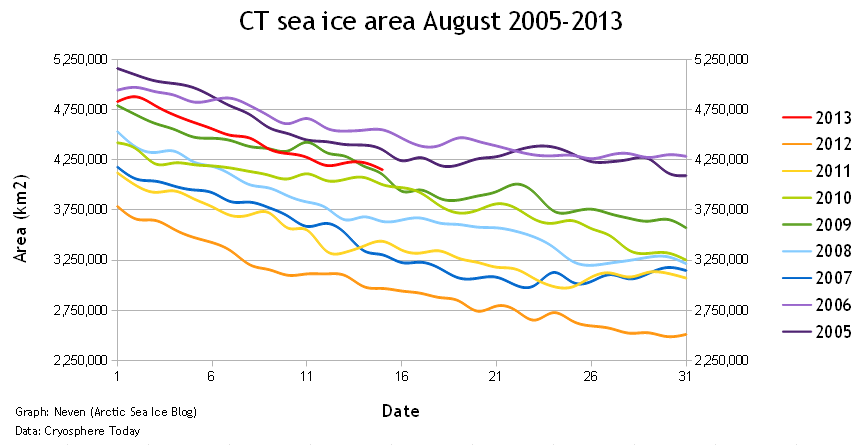We had a mild summer with colder-than-average August here in New York, and it looks like the Arctic may have had a cooler season as well. After two consecutive years of record-setting Arctic ice melt, 2013 was predicted to bring another low-point in ice cap surface area. Now near the end of the melting season, we can safely say that 2013 would not be another record-setting year. Take a look at this graph from the Arctic Sea Ice Blog:
The orange line at the bottom represents 2012; you can see how we started with very low ice cap surface and ended even lower. In fact, you can clearly see the trend that years since 2005 have mostly shown decreasing area of ice. In fact, from 2007 to 2012, we lost approximately 0.8 million square km of ice–which is equivalent to the size of Europe.
With such a trend, scientists had predicted that the summer of 2013 will bring another record-low, especially since much of the surface ice was first-year ice, which is more vulnerable. But three Arctic cyclones this season have stalled further melting, even adding 20,000 square km in the first week of August. That is not a significant amount, but the fact that the first-year ice held out better than expected, and that we’ve avoided setting another ignominious record, is quite encouraging!
While this news brings some relief, it’s still no reason to let the guard down. Prior to this unexpected reprieve in 2013, the leading experts in the study of glaciers, like the Canadian Ice Service and the University of Colorado, used the data (up until 2012) to predict that we may have ice-free summers in the Arctic as early as 2015. To progressives, the calamitous implications of ice-free Arctic are all too well-known: Devastation of biodiversity in the region, including the polar bear, one of our most iconic and beloved animals; disruption of the indigenous communities; rising water levels around the world.
 But even with such obviously disastrous consequences, not everyone views climate change—and the melting of the Arctic—with alarm. Governments around the world—the members of the Arctic Council, the EU, Japan, South Korea, and China—and multinational corporations view the Arctic ice melt as an unprecedented economic opportunity and a new frontier for hegemony and colonization. Estimates vary, but roughly 25% to 30% of world’s energy reserves (oil, gas, coal) are located in the Arctic, in addition to minerals and coldwater fish that are increasingly migrating to the Pole. Take a look at industry mouthpiece Oil Magazine, which presumes to call itself “without preconceived ideas or prejudices, trying to address the issue from multiple points of view.” Of the 17 articles in its Arctic issue (March 2013), only one addresses the environmental hazards of the melting ice at all. The rest of the articles point out that “the implications of climate change have led governments and businesses to pay more attention to the potential benefits from Arctic transport, tourism, fishing, and to the exploitation of its vast reservoirs of natural resources…Climate change [will] make the region more accessible, bolstering the attraction to the Arctic’s wealth of oil, gas, and mineral supplies.” Translation: The meltdown of the Arctic resulting from climate change will shorten travel time, connect the Pacific and the Atlantic, increase tourism (cruise ships to the North Pole!), increase fishing revenue (cod farming at the Pole!) and most of all, enable oil and gas extraction so we can create more greenhouse gases!
But even with such obviously disastrous consequences, not everyone views climate change—and the melting of the Arctic—with alarm. Governments around the world—the members of the Arctic Council, the EU, Japan, South Korea, and China—and multinational corporations view the Arctic ice melt as an unprecedented economic opportunity and a new frontier for hegemony and colonization. Estimates vary, but roughly 25% to 30% of world’s energy reserves (oil, gas, coal) are located in the Arctic, in addition to minerals and coldwater fish that are increasingly migrating to the Pole. Take a look at industry mouthpiece Oil Magazine, which presumes to call itself “without preconceived ideas or prejudices, trying to address the issue from multiple points of view.” Of the 17 articles in its Arctic issue (March 2013), only one addresses the environmental hazards of the melting ice at all. The rest of the articles point out that “the implications of climate change have led governments and businesses to pay more attention to the potential benefits from Arctic transport, tourism, fishing, and to the exploitation of its vast reservoirs of natural resources…Climate change [will] make the region more accessible, bolstering the attraction to the Arctic’s wealth of oil, gas, and mineral supplies.” Translation: The meltdown of the Arctic resulting from climate change will shorten travel time, connect the Pacific and the Atlantic, increase tourism (cruise ships to the North Pole!), increase fishing revenue (cod farming at the Pole!) and most of all, enable oil and gas extraction so we can create more greenhouse gases!
As insane as this argument sounds, this is the line of reasoning of governments around the world–the U.S., Canada, even the sexy Scandinavian countries we’d always wanted to “friend,” Russia (of course), and China (obvi)– and multinational corporations that are no less powerful than nation-states. Whether or not they publicly acknowledge climate change as a global issue, they are interested in taking advantage of climate change, not reversing it. Case in point: in May this year, President Obama’s National Strategy for the Arctic region paid lip service to “conservation” and “preservation,” while in fact staking a claim on the region’s mining, fishing, and military interests. The true objective of this polite, diplomatic document is revealed in the following statement:
The Arctic region’s energy resources factor into a core component of our national security strategy: energy security. The region holds sizable proved and potential oil and natural gas resources that will likely continue to provide valuable supplies to meet U.S. energy needs.
With such strong economic and political incentives, these powers will not move to stop Arctic ice melt–unless you make your voice heard. And as long as these powers view climate change as offering “new opportunities for world economy,” and not natural disasters, loss of whole ecosystems, and flooding of coastline cities and islands around the world, one good summer like we had won’t make any difference in the long run. So vegans of the world—exercise your political rights by showing that you don’t want the Arctic to turn into tropical waters with oil rigs and yachts, a.k.a. Florida.
Also in Editorial: Why You Should Care About GM Wheat
In-Vitro Meat is Not the Solution to the World’s Problems
Photos: (graph) Neven / Arctic Sea Ice Blog; (illustration) Peaceful Dumpling





